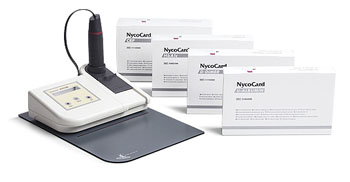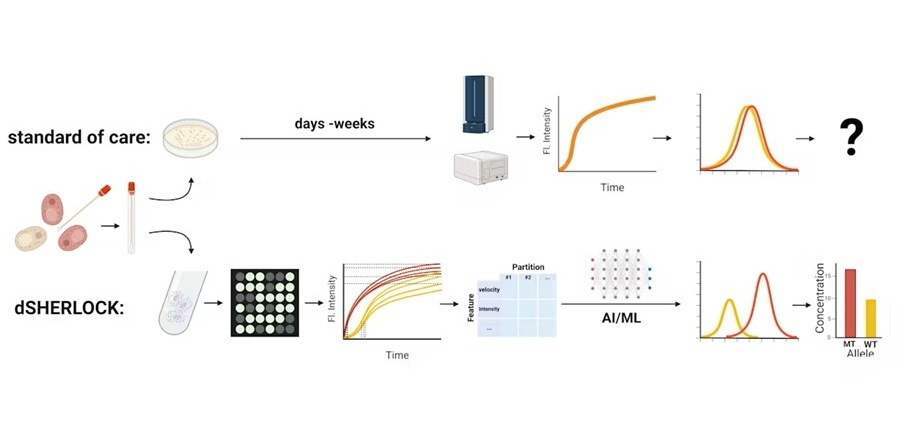Rapid Bacterial Infection Test Reduces Antibiotic Use
By LabMedica International staff writers
Posted on 18 Aug 2016
Inappropriate antibiotic use for acute respiratory tract infections is common in primary health care, but distinguishing serious from self-limiting infections is difficult, particularly in low-resource settings.Posted on 18 Aug 2016
A rapid test is able to detect C-reactive protein (CRP), a marker of infections caused by bacteria, in patients' blood and a low level of CRP is suggestive of viral infection and therefore antibiotic treatment is not required.

Image: The NyoCard II reader and test kits (Photo courtesy of Alere Technologies).
An international team of scientists led by those at the Radboud University, (Nijmegen, Netherlands) performed a multicenter open-label randomized controlled trial in ten primary health-care centers in northern Vietnam. Patients aged 1 to 65 years with at least one focal and one systemic symptom of acute respiratory tract infection were assigned 1:1 to receive either C-reactive protein point-of-care testing or routine care, following which antibiotic prescribing decisions were made. Between March 17, 2014, and July 3, 2015, 2,037 patients including 1,028 children and 1,009 adults were enrolled and randomized.
For patients in the intervention group, a finger prick to obtain capillary blood was done and analyzed using the quantitative NycoCard analyzer; the CRP single test kit was used with the NycoCard II Reader (Alere Technologies, Oslo, Norway) on enrolment (day 0) and retested on day 3, 4, or 5. Patients in the control group were treated according to routine practice and local treatment guidelines on enrolment and the second visit. All patients were followed up at two weeks after the initial health clinic visit by a structured telephone interview.
The cutoffs used to recommend that antibiotics not be prescribed were a CRP of 20 mg/L or less for patients aged 6 to 65 years, and a CRP of 10 mg/L or less for patients aged 1 to 5 years. Doctors were advised that adults with a CRP of 100 mg/L or more and children with a CRP of 50 mg/L or more should generally receive antibiotics and hospital referral should be considered. The number of patients who used antibiotics within 14 days was 581 (64%) of 902 patients in the C-reactive protein group versus 738 (78%) of 947 patients in the control group. Highly significant differences were seen in both children and adults, with substantial heterogeneity of the intervention effect across the 10 sites.
Heiman Wertheim, PhD, a professor and principal investigator, said, “There were large differences in the effect of the intervention between health centers; one center saw no effect due to antibiotic stocks they wanted to get rid of. This nicely illustrates one of the practical obstacles that need to be overcome.” His colleague, Nguyen Van Kinh, MD, PhD, added, “With this easy-to-use tool, primary healthcare providers can safely limit the unnecessary antibiotic use for viral respiratory infections. The study provides important evidence for simple solutions in antibiotic stewardship programs.” The study was published on August 2, 2016, in the journal The Lancet Global Health.
Related Links:
Radboud University
Alere Technologies













